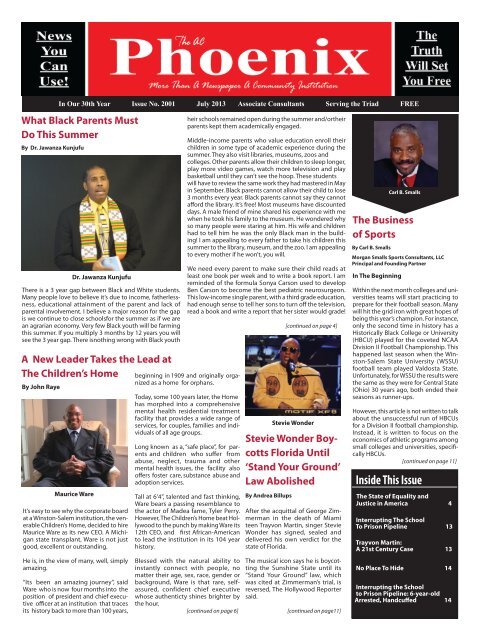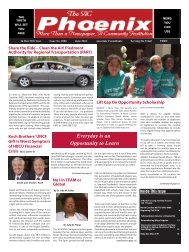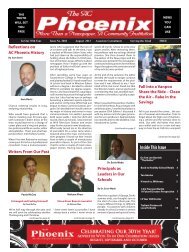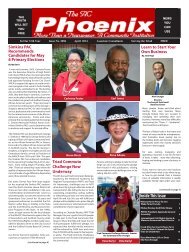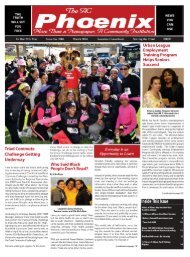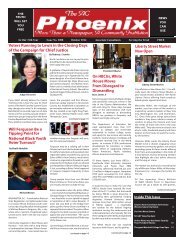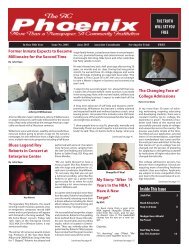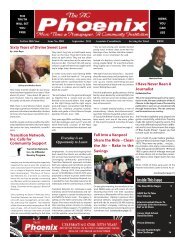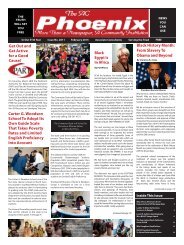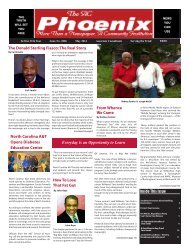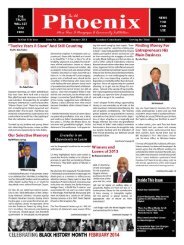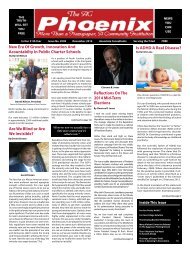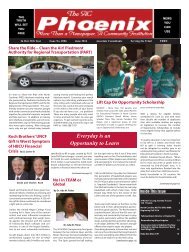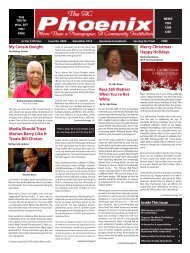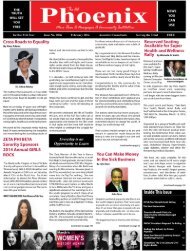The AC Phoenix: More than a Newspaper, a Community Institution -- Issue No. 2001, July 2013
What Black Parents Must do this Summer, By Dr. Jawanza Kunjufu The Business of Sports, By Carl B. Smalls, Morgan Smalls Sports Consultants, LLC Stevie Wonder Boycotts Florida Until 'Stand Your Ground' Law is Abolished, by Andrea Billups A New Leader Takes the Lead at the Children's Home, By John Raye Also Inside This Issue: The State of Equality and Justice in America Interrupting The School to Prison Pipeline Trayvon Matin: A 21st Century Case No Place to Hide Interrupting the School to Prison Pipeline: 6-year-old-Arrested, Handcuffed
What Black Parents Must do this Summer, By Dr. Jawanza Kunjufu
The Business of Sports, By Carl B. Smalls, Morgan Smalls Sports Consultants, LLC
Stevie Wonder Boycotts Florida Until 'Stand Your Ground' Law is Abolished, by Andrea Billups
A New Leader Takes the Lead at the Children's Home, By John Raye
Also Inside This Issue:
The State of Equality and Justice in America
Interrupting The School to Prison Pipeline
Trayvon Matin: A 21st Century Case
No Place to Hide
Interrupting the School to Prison Pipeline: 6-year-old-Arrested, Handcuffed
Create successful ePaper yourself
Turn your PDF publications into a flip-book with our unique Google optimized e-Paper software.
In Our 30th Year <strong>Issue</strong> <strong>No</strong>. <strong>2001</strong> <strong>July</strong> <strong>2013</strong> Associate Consultants Serving the Triad FREE<br />
What Black Parents Must<br />
Do This Summer<br />
By Dr. Jawanza Kunjufu<br />
Dr. Jawanza Kunjufu<br />
<strong>The</strong>re is a 3 year gap between Black and White students.<br />
Many people love to believe it’s due to income, fatherlessness,<br />
educational attainment of the parent and lack of<br />
parental involvement. I believe a major reason for the gap<br />
is we continue to close schoolsfor the summer as if we are<br />
an agrarian economy. Very few Black youth will be farming<br />
this summer. If you multiply 3 months by 12 years you will<br />
see the 3 year gap. <strong>The</strong>re isnothing wrong with Black youth<br />
A New Leader Takes the Lead at<br />
<strong>The</strong> Children’s Home<br />
By John Raye<br />
Maurice Ware<br />
It’s easy to see why the corporate board<br />
at a Winston-Salem institution, the venerable<br />
Children’s Home, decided to hire<br />
Maurice Ware as its new CEO. A Michigan<br />
state transplant, Ware is not just<br />
good, excellent or outstanding.<br />
He is, in the view of many, well, simply<br />
amazing.<br />
“Its been an amazing journey”, said<br />
Ware who is now four months into the<br />
position of president and chief executive<br />
officer at an institution that traces<br />
its history back to more <strong>than</strong> 100 years,<br />
heir schools remained open during the summer and/ortheir<br />
parents kept them academically engaged.<br />
Middle-income parents who value education enroll their<br />
children in some type of academic experience during the<br />
summer. <strong>The</strong>y also visit libraries, museums, zoos and<br />
colleges. Other parents allow their children to sleep longer,<br />
play more video games, watch more television and play<br />
basketball until they can’t see the hoop. <strong>The</strong>se students<br />
will have to review the same work they had mastered in May<br />
in September. Black parents cannot allow their child to lose<br />
3 months every year. Black parents cannot say they cannot<br />
afford the library. It’s free! Most museums have discounted<br />
days. A male friend of mine shared his experience with me<br />
when he took his family to the museum. He wondered why<br />
so many people were staring at him. His wife and children<br />
had to tell him he was the only Black man in the building!<br />
I am appealing to every father to take his children this<br />
summer to the library, museum, and the zoo. I am appealing<br />
to every mother if he won’t, you will.<br />
We need every parent to make sure their child reads at<br />
least one book per week and to write a book report. I am<br />
reminded of the formula Sonya Carson used to develop<br />
Ben Carson to become the best pediatric neurosurgeon.<br />
This low-income single parent, with a third grade education,<br />
had enough sense to tell her sons to turn off the television,<br />
read a book and write a report that her sister would grade!<br />
beginning in 1909 and originally organized<br />
as a home for orphans.<br />
Today, some 100 years later, the Home<br />
has morphed into a comprehensive<br />
mental health residential treatment<br />
facility that provides a wide range of<br />
services, for couples, families and individuals<br />
of all age groups.<br />
Long known as a, “safe place”, for parents<br />
and children who suffer from<br />
abuse, neglect, trauma and other<br />
mental health issues, the facility also<br />
offers foster care, substance abuse and<br />
adoption services.<br />
Tall at 6’4”, talented and fast thinking,<br />
Ware bears a passing resemblance to<br />
the actor of Madea fame, Tyler Perry.<br />
However, <strong>The</strong> Children’s Home beat Hollywood<br />
to the punch by making Ware its<br />
12th CEO, and first African-American<br />
to lead the institution in its 104 year<br />
history.<br />
Blessed with the natural ability to<br />
instantly connect with people, no<br />
matter their age, sex, race, gender or<br />
background, Ware is that rare, selfassured,<br />
confident chief executive<br />
whose authenticty shines brighter by<br />
the hour.<br />
[continued on page 6]<br />
[continued on page 4]<br />
Stevie Wonder<br />
Stevie Wonder Boycotts<br />
Florida Until<br />
‘Stand Your Ground’<br />
Law Abolished<br />
By Andrea Billups<br />
After the acquittal of George Zimmerman<br />
in the death of Miami<br />
teen Trayvon Martin, singer Stevie<br />
Wonder has signed, sealed and<br />
delivered his own verdict for the<br />
state of Florida.<br />
<strong>The</strong> musical icon says he is boycotting<br />
the Sunshine State until its<br />
“Stand Your Ground” law, which<br />
was cited at Zimmerman’s trial, is<br />
reversed, <strong>The</strong> Hollywood Reporter<br />
said.<br />
[continued on page11]<br />
<strong>The</strong> Business<br />
of Sports<br />
In <strong>The</strong> Beginning<br />
Carl B. Smalls<br />
By Carl B. Smalls<br />
Morgan Smalls Sports Consultants, LLC<br />
Principal and Founding Partner<br />
Within the next month colleges and universities<br />
teams will start practicing to<br />
prepare for their football season. Many<br />
will hit the grid iron with great hopes of<br />
being this year’s champion. For instance,<br />
only the second time in history has a<br />
Historically Black College or University<br />
(HBCU) played for the coveted NCAA<br />
Division II Football Championship. This<br />
happened last season when the Winston-Salem<br />
State University (WSSU)<br />
football team played Valdosta State.<br />
Unfortunately, for WSSU the results were<br />
the same as they were for Central State<br />
(Ohio) 30 years ago, both ended their<br />
seasons as runner-ups.<br />
However, this article is not written to talk<br />
about the unsuccessful run of HBCUs<br />
for a Division II football championship.<br />
Instead, it is written to focus on the<br />
economics of athletic programs among<br />
small colleges and universities, specifically<br />
HBCUs.<br />
[continued on page 11]<br />
Inside This <strong>Issue</strong><br />
<strong>The</strong> State of Equality and<br />
Justice in America 4<br />
Interrupting <strong>The</strong> School<br />
To Prison Pipeline 13<br />
Trayvon Martin:<br />
A 21st Century Case 13<br />
<strong>No</strong> Place To Hide 14<br />
Interrupting the School<br />
to Prison Pipeline: 6-year-old<br />
Arrested, Handcuffed 14
Page 2 <strong>July</strong> <strong>2013</strong> <strong>The</strong> <strong>AC</strong> <strong>Phoenix</strong>
Page 3 <strong>July</strong> <strong>2013</strong> <strong>The</strong> <strong>AC</strong> <strong>Phoenix</strong><br />
Congratulation On your 10th Anniversary!
Page 4 <strong>July</strong> <strong>2013</strong> <strong>The</strong> <strong>AC</strong> <strong>Phoenix</strong><br />
Melanie L. Campbell<br />
State of Equality and<br />
Justice in America:<br />
It’s Time to Step it Up,<br />
We Have <strong>No</strong>t Arrived!<br />
by Melanie L. Campbell<br />
Reflecting upon the past 50 years since<br />
the 1963 March on Washington we must<br />
pay homage to our civil rights leaders<br />
for their hard work, strength and<br />
endurance in the fight for equality and<br />
justice in America. <strong>The</strong>ir unwavering<br />
commitment to <strong>The</strong> Movement made it<br />
possible for a Black man named Barack<br />
Hussein Obama to become President of<br />
the United States of America.<br />
As I look at the state of equality and<br />
justice today, we are at a very critical<br />
moment in time. Our elders have taken<br />
us this far. Some have transitioned on,<br />
others are continuing on the battle<br />
field for justice. Also, with all the progress<br />
over the past 50 years, some of us<br />
are under the misguided impression<br />
that we have arrived. I feel compelled<br />
to appeal to my generation and today’s<br />
young leaders to make sure they<br />
understand: <strong>The</strong>re is no more time, we<br />
must take the torch or the fire will die.<br />
It’s time to step it up and get busy.<br />
<strong>The</strong> task before Black leaders today<br />
begins with making sure that those<br />
coming behind us understand that<br />
even though the Civil Rights Movement<br />
forced laws to change, it did not<br />
change the hearts and minds of all<br />
Americans. Some of those who want<br />
to retain their power and money are<br />
threatened by inclusion.<br />
Our young people must understand<br />
that a small group of people are continuously<br />
plotting to create new ways<br />
to exclude entire communities. In<br />
<strong>2013</strong>, new school activists must make<br />
sure our young people understand<br />
that racism and inequality may not always<br />
manifest itself in a white sheet or<br />
barking dog but the dogs are still biting.<br />
Inequality comes in many packages.<br />
Back in the day people in power relied<br />
on slick tactics like Jim Crow Laws and<br />
Poll Taxes to hold us back. Today, it’s<br />
voter IDs and the “War on Drugs.” For<br />
example, a person with a non-violent<br />
drug conviction on their record is restricted<br />
in their ability to secure housing,<br />
financial aid for education, public<br />
assistance, jobs, and the right to vote.<br />
What does the fight for equality and<br />
justice look like in <strong>2013</strong> and beyond?<br />
In <strong>2013</strong> and beyond our fight is not<br />
just for access to education. We must<br />
make sure our schools are teaching<br />
critical thinking, promoting innovation,<br />
and preparing our youth for jobs<br />
in science, technology, engineering,<br />
and math (STEM). <strong>The</strong> U.S. Census Bureau’s<br />
2009 American <strong>Community</strong> Survey<br />
reports that STEM workers earn<br />
more <strong>than</strong> other workers. <strong>No</strong>n-Hispanic<br />
Whites hold 72 percent of STEM jobs<br />
while only 6 percent of STEM jobs are<br />
held by <strong>No</strong>n-Hispanic Blacks.<br />
In 1963 March organizers called for<br />
“Dignified Jobs.” In <strong>2013</strong> “Dignified<br />
Jobs” must provide good jobs with a<br />
livable wage. We must also unite to<br />
support our unions and workers’ rights.<br />
Modern-day equality struggles include<br />
closing the digital divide. Access<br />
to high-speed broadband Internet will<br />
increase job and educational opportunities<br />
as well as democratic participation.<br />
Broadband access will also help<br />
to lower health care costs and make<br />
quality medical care more accessible<br />
to the Black community.<br />
Diversity strengthens our democracy.<br />
We must make sure employers don’t<br />
just talk about “diversity” and “women’s<br />
equality”, but also back up the talk<br />
through their hiring practices. From<br />
the federal government to Wall Street<br />
to the corner store, we want to see<br />
Black women represented in top positions.<br />
<strong>The</strong> elimination of racial disparities<br />
in our criminal justice system is paramount.<br />
<strong>The</strong> U.S. has the highest incarceration<br />
rate in the world. Pew Charitable<br />
Trusts reports that the incarceration<br />
rate for Blacks is more <strong>than</strong> six<br />
times as high as the national average<br />
and over 60 percent of those incarcerated<br />
are racial and ethnic minorities.<br />
In <strong>2013</strong> and beyond we will continue<br />
to lead the fight to eliminate barriers<br />
to civic participation fighting against<br />
restrictive voter ID laws, felon disenfranchisement<br />
and any other tactics<br />
created to block Black people from<br />
voting.<br />
Finally, I must address our responsibility<br />
as a people to work harder to prepare<br />
our youth in this ongoing fight<br />
for justice and equality. We must encourage<br />
them to pursue STEM careers,<br />
teach them to be environmentally<br />
conscious, and help them understand<br />
the dire need to stop the violence in<br />
our neighborhoods. We must take<br />
the time to instill good moral values<br />
so they turn to each other and not on<br />
each other and our journey will not be<br />
in vain.<br />
As we celebrate 50 years of progress,<br />
let’s <strong>than</strong>k our elders for their great<br />
fight by stepping it up because we<br />
have not arrived.<br />
Melanie Campbell is president/CEO of the National<br />
Coalition on Black Civic Participation and<br />
convener of the Black Women’s Roundtable.<br />
Trust in the Lord<br />
with all your heart<br />
Proverbs 3:5<br />
<strong>The</strong> National<br />
Primitive Baptist<br />
Convention, USA<br />
Convenes in<br />
LA, California<br />
Elder Bernard C. Yates, President<br />
Hosted by the Western Region and<br />
local Primitive Baptist churches in<br />
the Los Angeles area, approximately<br />
1500-2000 individuals comprising of<br />
national officers, auxiliaries, regional<br />
vice presidents, state presidents,<br />
moderators, pastors, elders, delegates,<br />
and laity of the National Primitive<br />
Baptist Convention, USA will convene its<br />
106th Annual Session on August 18-23<br />
at <strong>The</strong> Westin Bonaventure, 404 South<br />
Figueroa Street, Los Angeles, California.<br />
Elder Dr. Bernard C. Yates, Pastor of<br />
Zion Hope Primitive Baptist Church,<br />
Pensacola, Florida, is the General<br />
President and the 6th individual to lead<br />
this national organization from the<br />
State of Florida.<br />
For six days, this national body will<br />
assemble to: 1) conduct business<br />
on behalf of the body; 2) participate<br />
in Church School Training Sessions,<br />
Lectures, and Workshops; 3) hear the<br />
Word of the Lord from the clergies,<br />
share in joyous worship experiences,<br />
inspirational singing from the National<br />
Choir, and daily Bible Expositions; 4)<br />
promote evangelism and mission;<br />
and, 5) fellowship with each other.<br />
Live internet streaming of Wednesday,<br />
Thursday, and Friday worship<br />
services can be viewed on www.<br />
faithvideoondemand.com.<br />
<strong>The</strong> theme for this year’s annual<br />
session is “Celebrating the Church:<br />
Worshipping, Working, Warring, and<br />
Winning” (John 4:23; Ephesians 4:11-<br />
12; Ephesians 6:10-11; Psalms 126:5-6).<br />
At this year’s annual session, President<br />
Yates will challenge the organization to<br />
“occupy till He comes” meaning to be<br />
busy about the Master’s business until<br />
Christ returns. <strong>The</strong> focus for this year’s<br />
annual session is to return with passion<br />
to the following priorities: worship,<br />
work, warfare, and winning the world<br />
for Christ.<br />
About <strong>The</strong> National Primitive<br />
Baptist Covention, USA<br />
Inspired by a desire for unity and<br />
Christian fellowship among Primitive<br />
Baptists in the United States of<br />
America, this national organization<br />
was organized on <strong>July</strong> 17, 1907 as<br />
the Colored Primitive Baptists of<br />
America (now known as the National<br />
Primitive Baptist Convention, USA) by<br />
Dr. Clarence Frances Sams of Key West,<br />
Florida and Elder George S. Crawford<br />
of DeLand, Florida---after enlisting the<br />
support and cooperation of leading<br />
pastors and moderators of Florida,<br />
Alabama, and <strong>No</strong>rth Carolina.<br />
Today, the largest concentration of<br />
Primitive Baptists who are members<br />
of the National Primitive Baptist<br />
Convention, USA still remains in the<br />
State of Florida.<br />
What Black Parents<br />
Must Do This<br />
Summer<br />
By Dr. Jawanza<br />
[continued from page 1]<br />
I have a theory that I can go into your<br />
house and within 5 minutes tell you<br />
the type of student who lives there<br />
and predict their future. I believe that<br />
engineers, doctors, lawyers, accountants<br />
etc. need different items in their<br />
house <strong>than</strong> ballplayers, rappers, and<br />
criminals. I am very concerned when<br />
I visit a house that has more cd’s and<br />
downloads <strong>than</strong> books. My company<br />
African American Images has designed<br />
a special collection of books for boys.<br />
Research shows one of the major reasons<br />
boys dislike reading is because of<br />
the content. <strong>The</strong> set is titled Best Books<br />
for Boys. We also have one for girls,<br />
parents and teachers. Enjoy your summer.<br />
Let’s close the gap. I look forward<br />
to your child’s<br />
teacher asking your child what did you<br />
do for the summer? And your child<br />
answering we went to the library, museum,<br />
zoo, colleges and other great<br />
educational places.<br />
Author of “<strong>The</strong>re is <strong>No</strong>thing Wrong With<br />
Black Students, Changing School Culture<br />
For Black Males And<br />
Raising Black Boys”
Page 5 <strong>July</strong> <strong>2013</strong> <strong>The</strong> <strong>AC</strong> <strong>Phoenix</strong><br />
Moving On Up<br />
Taking Yourself To <strong>The</strong><br />
Next Level<br />
By Dr. Ernie Wade<br />
Dr. Ernie Wade<br />
Dear High School Student,<br />
Many of you are struggling to achieve<br />
a higher academic performance. It<br />
is not an easy task, but moving to a<br />
higher level of performance is possible.<br />
A prerequisite for high academic<br />
performance is a sincere and strong<br />
belief in self. It is important that you<br />
believe that you are worthy and have<br />
been blessed with a great mind. This<br />
belief is the foundation upon which<br />
you will build this strong sense of self.<br />
As a high school student you don’t<br />
usually spend a great deal of time on<br />
personal growth and development.<br />
Personal growth is a process that is<br />
related to self- improvement and the<br />
acquisition of skills. It is something<br />
that should certainly play a larger role<br />
in your life. <strong>The</strong> sooner you begin to<br />
look and examination of your feelings,<br />
thoughts and ideas about your<br />
academic standing and performance.<br />
It also entails an academic personal<br />
An Associate Consultant’s<br />
<strong>Newspaper</strong><br />
Established in 1983<br />
Rodney J. Sumler, Publisher<br />
Jerome Johnson, Managing Editor<br />
Dwight A. Jones, Editor<br />
Ann F. Sumler, Finance Director<br />
Advertising Constants<br />
Chenita Johnson, Gerald Green<br />
A Creative Mind, Graphic Design<br />
Ideas expressed in this publication<br />
are not necessarily those of the<br />
publisher or staff.<br />
(336) 635 4096 Fax (336) 635 4567<br />
e-mail: acphoenix@bellsouth.net<br />
inventory; a close look at what you<br />
have academically, how much you<br />
have academically, and what you need<br />
to do to make it more attractive to<br />
colleges and universities.<br />
When you start this introspection,<br />
your journey toward academic change<br />
begins. You will find that as you begin<br />
the process, it will require personal<br />
change, and change starts on the<br />
inside. I like to tell students, “academic<br />
success is an inside job it starts in of<br />
you”.<br />
One of the elements of academic<br />
failure is never feeling good enough.<br />
When you lack confidence in yourself<br />
and your abilities, any small failure will<br />
set you back and allow you to lapse<br />
into inactivity. However, when you<br />
attack assignments with confidence<br />
in your ability, if failure occurs, you<br />
accept it, determine how and why it<br />
occurred, take corrective action and<br />
move forward.<br />
I have developed a set of principles<br />
that will help you in your introspective<br />
process. <strong>The</strong> list could be much longer,<br />
but I have narrowed it down to just ten.<br />
1. Your Reason For Being<br />
Why are you here? Start the search to<br />
find out who you are and where you<br />
are going. Keep a personal growth<br />
and development journal. Develop a<br />
personal vision for your life in the best<br />
way you can imagine. Each day, take<br />
a few minutes to write down where<br />
you want to go in life. Where would<br />
you like to do? Where would you like<br />
to live? Get started, and you will find<br />
that as time goes by you will become<br />
better and more specific as you move<br />
along through your high school career.<br />
Make sure your expectations are yours<br />
and not those of your family, friends<br />
and others.<br />
2. <strong>No</strong>w Is <strong>The</strong> Time<br />
You will be faced with multiple tasks<br />
in high school and will find the need<br />
to perform many tasks concurrently.<br />
<strong>The</strong> need to learn study and time<br />
management skills early is critically<br />
important. <strong>The</strong> number of tasks<br />
increases as you move forward in<br />
high school and increases even more<br />
as you move on to college. Often the<br />
hardest task is getting started. You<br />
must learn to initiate action. Don’t<br />
sit and dwell on how many, how hard<br />
or how long, get started. Don’t wait<br />
until later, tomorrow or next week, get<br />
started. <strong>No</strong>w is the very best time to<br />
get started.<br />
3. You Are Bigger Than Your Fears<br />
You cannot allow your fears to get in<br />
the way of your progress. Too often I<br />
hear “I’m not good at math or I’m not<br />
good at science”. This thinking gets<br />
in the way of academic excellence.<br />
Instead of giving into your fears, fight<br />
through them, struggle through them,<br />
work through them, cry through<br />
You cannot allow your fears<br />
to get in the way of your progress. Too<br />
often I hear “I’m not good at math or<br />
I’m not good at science”. This thinking<br />
gets in the way of academic excellence.<br />
Instead of giving into your fears, fight<br />
through them, struggle through them,<br />
work through them, cry through<br />
4. Learn From Your Mistakes<br />
Treat mistakes as preparation for your<br />
next move. Do not allow them to<br />
lull you into inactivity? Too often we<br />
wallow in the fact that something did<br />
not go as we had planned, and we<br />
spend far too much time examining<br />
and reexamining and the examining<br />
what we just reexamined. Don’t tread<br />
water in the misery of your mistake.<br />
We all make mistakes. Ask anyone<br />
who has achieved any measure of<br />
success about their mistakes and they<br />
will tell you they have had many. <strong>The</strong><br />
key is to move beyond them, learn<br />
from them and use them as lessons<br />
for your next step. Remember, those<br />
who make no mistakes, are those who<br />
attempt nothing.<br />
5. Position Positive Peers<br />
If you are to be a successful, high<br />
achieving high school student, it<br />
is absolutely imperative that you<br />
surround yourself with people who<br />
have similar goals, dreams, and<br />
aspirations. We all have friends who<br />
have goals that are different from ours.<br />
However they should at least have<br />
goals and aspirations. Understand<br />
that it becomes increasingly more<br />
difficult to move to your highest<br />
level of achievement in school if your<br />
closest friends and associates are<br />
students who don’t like school. Being<br />
a top student can be very difficult and<br />
time intensive. <strong>The</strong> pull between your<br />
academic demands and friends who<br />
find school boring, uninspiring, and<br />
a waste can become overwhelming.<br />
It can also be isolating. You must<br />
distance yourself from the” I can’t, we<br />
can’t, I don’t want to, why dowe have<br />
to crowd”. <strong>The</strong>y will drain you and<br />
become the source of your demise.<br />
Select for yourself a “tuff times team”<br />
a group of friends and acquaintances<br />
who have achievement goals and<br />
aspirations similar to yours, and when<br />
you feel alone on that “you think you’re<br />
better <strong>than</strong> us because you get really<br />
good grades” island, turn to them for<br />
support.<br />
6. Keep It Simple<br />
Straighten out the crooked parts<br />
of your life. Work to clean up the<br />
contradictions. If you want to become<br />
a better, higher achieving student<br />
but you don’t want to spend the<br />
time necessary to do so; clean up the<br />
contradiction. If you say you want to<br />
become an engineer but at the same<br />
time say you don’t like math; clean up<br />
the contradiction.<br />
7. Show Me <strong>The</strong> Money<br />
Money is not everything, but knowing<br />
how to get it, use it, and keep it is<br />
important. You should learn how to<br />
handle and budget money while in<br />
high school but surely before you<br />
leave high school and head off to<br />
college. Upon arriving at college,<br />
you will be bombarded with offers<br />
of free credit cards and it is in your<br />
best interest to be a able to “just say<br />
no”. Many college students succumb<br />
to the “offers” of free credit cards and<br />
end up with tremendous credit card<br />
debt. Far too many people only know<br />
how to work for money, and not to<br />
have money work for them. Learning<br />
how to have both people and money<br />
working for you is one of the keys to<br />
financial success and freedom.<br />
8. Take Care Of You<br />
You must be able to count on your<br />
body to support you through stressful<br />
times of your high school journey. It is<br />
imperative that you eat right, exercise<br />
and get the proper amount of sleep.<br />
Far too many high school students<br />
come to school and try to function<br />
without having eaten breakfast or<br />
having had sufficient sleep. That’s like<br />
trying to run a high powered vehicle<br />
with too little gas and without proper<br />
maintenance. If you take care of your<br />
body, your body will take care of you.<br />
9. Let Go Of <strong>The</strong> Rope<br />
<strong>No</strong> matter how bad your situation has<br />
been. <strong>No</strong> matter what your academic<br />
performance has been, you can start<br />
over and improve your academic<br />
standing. However, you must start<br />
over with a new attitude, an attitude<br />
of success. You must start believing<br />
in your ability to be successful. <strong>No</strong><br />
class can be too hard, no teacher too<br />
demanding. You must believe you<br />
have what it takes, to take what is<br />
presented to you. You cannot move<br />
to the next level academically carrying<br />
last years, last months, last weeks or<br />
yesterdays’, mistakes. You must move<br />
to realize your potential. Potential is<br />
that innate ability lying just below the<br />
surface of your previous performance.<br />
Take steps to realize your potential.<br />
[continued from page 6]
Page 6 <strong>July</strong> <strong>2013</strong> <strong>The</strong> <strong>AC</strong> <strong>Phoenix</strong><br />
Moving On Up<br />
Taking Yourself To <strong>The</strong><br />
Next Level<br />
By Dr. Ernie Wade<br />
[continued from page 5]<br />
<strong>The</strong> great thing about potential is that<br />
it is not about what you have done,<br />
but all about what you are about to<br />
do.<br />
10. Don’t Forget To Say Thanks<br />
On your way to the next level and<br />
beyond, you will encounter people<br />
who will have a significant impact on<br />
your life. <strong>The</strong>se will be people who<br />
will chastise you, love you guide you,<br />
encourage you and help you in many<br />
ways. You will know some better <strong>than</strong><br />
others. <strong>The</strong>re will be people in your<br />
life who see the great things in you<br />
that you do not see in yourself. A little<br />
<strong>than</strong>k you can go a long ways.<br />
Moving forward, I want you to spend<br />
some time with these ten principles.<br />
Take them seriously and watch how<br />
they will impact your life.<br />
Remember, hard work pays off,<br />
dreams take time and require discipline,<br />
your expectations require effort,<br />
and your future requires daily<br />
focus.<br />
Sincerely yours,<br />
Dr. Ernie Wade<br />
Dr. Ernie Wade is the former Director of Minority<br />
Affairs, Project Ensure and the Kaleidoscope<br />
Academy of Math and Science at Wake Forest<br />
University. He is the President and lead Consultant<br />
of College Bound Consultants. He can<br />
be reached at 336-391-4136 and ewade@triad.<br />
rr.com<br />
A New Leader Takes<br />
the Lead at<br />
<strong>The</strong> Children’s Home<br />
By John Raye<br />
[continued from page 1]<br />
“ I am just excited about this opportunity,<br />
excited to be doing the work<br />
that I enjoy and love to do”, said Ware<br />
who appears to never have met a<br />
stranger, an indication perhaps of why<br />
he moves effortlessly among friends,<br />
families, children and strangers alike.<br />
“I have a passion for working with<br />
people, especially with children. And<br />
God did not give me a spirit of fear. I<br />
believe if you want something, then<br />
you have to get up and go get it,” he<br />
said.<br />
A seasoned health care professional<br />
and educator with a friendly, outgoing<br />
and engaging manner, Ware knows<br />
his way around the education arena.<br />
Most of his professional life was spent<br />
in Albion, Michigan where he worked<br />
in the public school system for nearly<br />
a dozen years as an assistant principal,<br />
principal and mental health educator<br />
before re-locating to Charlotte, <strong>No</strong>rth<br />
Carolina in 2011.<br />
“It was during an invitation from<br />
friends to come and go to the CIAA<br />
basketball tournament that I fell in<br />
love with the area”, he said. “You know<br />
there is a lot of snow and ice up where<br />
I come from, and once here, I made<br />
the decision to leave and move down<br />
here”, he said.<br />
Referring to Paula, his wife of 18years,<br />
Ware said life was pretty good before<br />
the economy tanked and both he and<br />
his wife found themselves unemployed.<br />
“Losing two jobs within one year,<br />
well, that was pretty stressful for a<br />
minute but God always provide”, said<br />
Ware who relocated to the Charlotte<br />
area and was soon employed as the<br />
Director of Residential services of the<br />
Keys of Carolina, a 60 bed Psychiatric<br />
Residential Treatment Facility.<br />
Referring to his present position,<br />
Ware said,” I didn’t wait for this position<br />
to find me. I knew I had the<br />
background—the experience, the<br />
education and the ability to serve in<br />
this position.”<br />
Evidently, the Board agreed.<br />
Ware holds undergraduate and graduate<br />
degrees including a Master’s<br />
Degree in Counselor Education-Counseling<br />
Psychology, and a boatload of<br />
other awards, honors and certificates<br />
including a certified OMPH—Qualified<br />
Mental Health Professional award.<br />
It is his passion, zeal and drive to<br />
excel that moves Ware to pursue a<br />
spirit of excellence in his work. “God<br />
is the head of everything”, he noted.<br />
“I am just the vessel”. He and his wife,<br />
Paula, are the parents of four children.
Page 7 <strong>July</strong> <strong>2013</strong> <strong>The</strong> <strong>AC</strong> <strong>Phoenix</strong>
Page 8 <strong>July</strong> <strong>2013</strong> <strong>The</strong> <strong>AC</strong> <strong>Phoenix</strong>
Page 9 <strong>July</strong> <strong>2013</strong> <strong>The</strong> <strong>AC</strong> <strong>Phoenix</strong>
Page 10 <strong>July</strong> <strong>2013</strong> <strong>The</strong> <strong>AC</strong> <strong>Phoenix</strong>
Page 11 <strong>July</strong> <strong>2013</strong> <strong>The</strong> <strong>AC</strong> <strong>Phoenix</strong><br />
Stevie Wonder<br />
Boycotts Florida<br />
Until ‘Stand Your<br />
Ground’ Law<br />
Abolished<br />
By Andrea Billups<br />
[continued from page 1]<br />
“Until the Stand Your Ground law is<br />
abolished, I will never perform there<br />
again,” he said to cheers.<br />
Florida, however, is not the only state<br />
to feel Wonder’s wrath.<br />
“As a matter of fact, wherever I find<br />
that law exists, I will not perform in<br />
that state or in that part of the world,”<br />
Wonder said Sunday at his performance<br />
in Canada’s Quebec City.<br />
Editor’s <strong>No</strong>te: Seniors Scoop Up<br />
Unclaimed $20,500 Checks? (See if<br />
You qualify)<br />
As mass protests continue around<br />
the country and other musicians pay<br />
tribute to Martin, many are calling for<br />
renewed awareness of civil rights and<br />
justice as they decry the jury’s decision<br />
to find Zimmerman not guilty in the<br />
shooting death of Martin, 17.<br />
Wonder encouraged his own fans to<br />
support him in speaking out against<br />
what he sees as an injustice.<br />
“<strong>The</strong> truth is that -- for those of you<br />
who’ve lost in the battle for justice,<br />
wherever that fits in any part of the<br />
world -- we can’t bring them back,” he<br />
said in an emotional video posted on<br />
You Tube.<br />
“What we can do is we can let our<br />
voices be heard. And we can vote<br />
in our various countries throughout<br />
the world for change and equality for<br />
everybody. That’s what I know we can<br />
do,” Wonder said.<br />
<strong>The</strong> Business of<br />
Sports<br />
By Carl B. Smalls<br />
[continued from page 1]<br />
In economics, there is a basic concept<br />
that centers on supply and demand<br />
as it relates to price and human behavior.<br />
For example, if supply exceeds<br />
demand then prices decrease; conversely,<br />
if demand exceeds supply<br />
then prices increase. Regrettably, for<br />
many HBCU athletic programs, basic<br />
economics appear to have taken a<br />
sabbatical and replaced by unsound<br />
business practices.<br />
Perhaps it is because the majority of<br />
HBCUs are land granted institutions,<br />
meaning they are public institutions<br />
and these small public institutions<br />
generally rely heavily on funding their<br />
athletic programs through athletic<br />
fees charged to students. Though this<br />
simple approach may provide instant<br />
funding, this practice has several<br />
shortfalls. <strong>The</strong> first being that athletic<br />
programs generally have a tendency<br />
to grow much faster <strong>than</strong> student enrollment.<br />
In some cases, the relationship<br />
may be inversely related – meaning<br />
athletic costs go up while student<br />
enrollment (revenues from fees) goes<br />
down. Secondly, the athletic fees<br />
charged to the student increases the<br />
overall cost of attending the institution.<br />
Hence, affecting the institution’s<br />
competitiveness in the market place.<br />
Thirdly, this practice of simply taxing<br />
the student through athletic fees<br />
has stifled the creativity to pursue<br />
alternative funding sources. Lastly,<br />
the decision of whether an increase<br />
in student fees will be approved is<br />
not the choice of the institution, but<br />
at the sole discretion of the board of<br />
governors or regents of the particular<br />
university system.<br />
By <strong>The</strong> Numbers<br />
According to the NCAA Division II<br />
for the 2010-11 academic year, the<br />
median total expenses for athletic<br />
programs with football was $5.1 million<br />
for both public (51%) and private<br />
(49%) institutions. My estimate is<br />
there is not one Division II, HBCU athletic<br />
program with a budget of $5.1<br />
million. <strong>The</strong>refore, how will they compete<br />
or be competitive if program<br />
funding is sub par? On average, Division<br />
II programs offer 15 sports and<br />
approximately half (46%) of them<br />
has enrollment of 2,499 and below.<br />
Looked at from the present method<br />
used by these institutions to generate<br />
athletic program funding, students<br />
would be taxed at a rate (athletic fee)<br />
of $2,041 per student to reach the<br />
median budget of $5.1 million (2,499<br />
x $2,041). This is outrageous at best.<br />
Moving Forward<br />
If, for example, the majority of Division<br />
II student athletes pay for college<br />
through a combination of scholarship<br />
money, grants, student loans<br />
and employment earnings, wouldn’t<br />
basic economics suggest that to increase<br />
the demand (assuming everything<br />
else basically stayed the same),<br />
you would not mark up the price (tuition);<br />
but would instead increase the<br />
demand by offering a better product?<br />
So then, the fundamental question is,<br />
how does one offer a better product?<br />
In business there are best practices<br />
that govern day-to-day operations<br />
that work toward improving the overall<br />
financial health of an organization.<br />
It boils down to the customer experience.<br />
Each time a business and a customer<br />
interact, the customer learns<br />
something that will either strengthen<br />
or weaken the future relationship<br />
and that customer’s desire to return,<br />
spend more and recommend the experience<br />
to others.<br />
As in business, this is equally true for<br />
intercollegiate athletic programs that<br />
are trying to maximize attendance,<br />
ticket revenues, corporate sponsorships,<br />
suite sales, concessions, licensing<br />
and booster donations. Sadly, for<br />
many of the smaller programs, suites<br />
are not an option, concessions may<br />
not be either, and corporate sponsorships<br />
and licensing are generally<br />
small contributors or nonexistent.<br />
So it is no longer enough to field a<br />
winning team. As fans have grown<br />
more sophisticated, they want to<br />
know how teams and athletic programs<br />
are evolving to provide consistent<br />
and entertaining products<br />
that transcend a team’s performance.<br />
<strong>No</strong>w, more <strong>than</strong> ever, it is imperative<br />
to not only acknowledge this perspective<br />
but respond to it by building,<br />
nurturing, sustaining and expanding<br />
your brand.<br />
A strong fan base is the most important<br />
asset an athletic program<br />
can achieve. Athletic programs must<br />
apply sound business practices to<br />
secure the longevity and loyalty of<br />
their customers (fans). <strong>The</strong>se practices<br />
must be built on the powerful<br />
relationship between experiences<br />
and a brand that generates superior<br />
bottom-line results.<br />
Though each athletic program is different,<br />
it is critical that they seek the<br />
assistance of a sports marketing firm<br />
to help them blend their mission and<br />
unique strengths with the best practices<br />
of sports marketing to further<br />
differentiate the program and create<br />
a targeted message to redefine the<br />
ultimate fan experience. Otherwise,<br />
they will continue to practice voodoo<br />
economics and subsequently experience<br />
what historically all institutions<br />
have experienced when there is taxation<br />
with no representation, a revolt.<br />
Mr. Smalls is a graduate of <strong>No</strong>rth Carolina A&T<br />
State University and received his MBA from the<br />
Atlanta University Graduate School of Business<br />
where he was a Volkswagen of America Scholar.<br />
He is a graduate of Harvard University, John F.<br />
Kennedy School of Government Program on Investment<br />
Decisions and Behavior Finance.<br />
Smalls is the President, CEO and Founding Partner<br />
of Morgan Small Sports Consultants, LLC.<br />
We Serve An Awesome God
Page 12 <strong>July</strong> <strong>2013</strong> <strong>The</strong> <strong>AC</strong> <strong>Phoenix</strong><br />
When Will Obama<br />
Address Black<br />
Unemployment?<br />
By Clarence B. Jones<br />
Diversity Visiting Professor, University<br />
of San Francisco; and Scholar<br />
Writer in Residence, MLK, Jr. Institute,<br />
Stanford University<br />
Thanks to Paul Solman of PBS Business<br />
Desk, in addition to Doug Ross’s<br />
Journal, there is at least some media<br />
attention being directed at this serious<br />
problem:<br />
“Job Rate For Poor Black Teen Dropout?<br />
Try 95%” (Paul Solman of PBS<br />
Business Desk)<br />
Paul Solman: And how about kids<br />
that are not in school, what percentage<br />
of them ages 16 to 19 is not working<br />
now?<br />
Clarence B. Jones<br />
Diversity Visiting Professor, University<br />
of San Francisco; and Scholar Writer in<br />
Residence, MLK, Jr. Institute, Stanford<br />
University<br />
Thanks to the Doug Ross@Journal we<br />
are able to drill down deeper into our<br />
current “true unemployment.” This<br />
includes, for example, part-timers<br />
seeking full-time work (also known as<br />
“U-6”) that jumped to 14.3 percent, a<br />
six-month high.<br />
“<strong>The</strong> Labor Force Participation Rate,<br />
has never been lower since the seventies<br />
-- the percentage of eligible<br />
workers who actually have a job -- has<br />
stubbornly remained under 64 percent<br />
since 2011.” Against this background<br />
the “unemployment rate for<br />
African-Americans is a devastating<br />
23.7 percent,” for Hispanics 13.2 percent,<br />
women 11.6% and youth overall,<br />
16.1%<br />
<strong>The</strong> real largely untold story about<br />
our economy, however, is the magnitude<br />
of unemployment among African-American<br />
youth.<br />
What a poignant political and historical<br />
irony that our nation’s first elected<br />
African-American president would<br />
promote and sponsor a domestic political<br />
agenda that will facilitate one of<br />
the highest rates of unemployment<br />
in the African-American community,<br />
particularly among teenagers? This is<br />
exactly the probable consequence if<br />
the pending Immigration Bill passes<br />
in the House.<br />
Andrew Sum: Over half. If you’re a high<br />
school dropout you’re talking about<br />
30 percent working. Among high<br />
school grads who graduated from<br />
high school in the last three years --<br />
we do a separate survey of them the<br />
fall after graduation -- 45 percent of<br />
them held a job, the lowest in the last<br />
50 years we’ve been collecting this<br />
data. And to make it worse, of that 45<br />
percent, only half of them were able<br />
to get a full-time job. Only one in five<br />
young high school grads, not in college,<br />
[is] working full-time.<br />
Paul Solman: So, you mean, it’s effectively<br />
an 80 percent underemployment<br />
rate?<br />
Andrew Sum: Yes. And, if you happen<br />
to be a young black male, we’re talking.<br />
Ninety percent are not working<br />
full-time.<br />
<strong>The</strong> analysis and comments of Paul<br />
Solman are independent from those<br />
in my previous blog about the likely<br />
consequences the passage of the<br />
pending Immigration Bill will have on<br />
high black unemployment, especially<br />
among black teenagers<br />
Why does President Obama continue<br />
to get a “pass” or “get out of jail card”<br />
free on this issue?<br />
Is this the way our nation plans to<br />
celebrate and commemorate, next<br />
month, the 50th Anniversary of Dr.<br />
King’s prophetic “I Have a Dream”<br />
speech at the foot of the Lincoln Memorial<br />
in Washington, DC?<br />
Thomas Jefferson said,” I tremble for<br />
my country when I reflect that God is<br />
just; that his justice cannot sleep forever”<br />
What say you, Mr. President? Is the impact<br />
of the pending Immigration Bill<br />
on high black unemployment your<br />
legislative response on behalf of the<br />
“Joshua Generation” to the Dream of<br />
the “Moses Generation”?<br />
In a previous blog I wrote that high<br />
black unemployment is being “thrown<br />
under the bus” to satisfy the demands<br />
of the business community and the<br />
unprecedented lobbying money and<br />
efforts of Silicon Valley and other high<br />
tech businesses.<br />
Where are the outraged voices of<br />
the labor movement and leaders in<br />
the African-American <strong>Community</strong>,<br />
aside from other voices of moral conscience?<br />
Does anybody care?
Page 13 <strong>July</strong> <strong>2013</strong> <strong>The</strong> <strong>AC</strong> <strong>Phoenix</strong><br />
put on a pathway to career or college rather<br />
<strong>than</strong> the destructive criminal justice system.<br />
Interrupting the<br />
School to Prison<br />
Pipeline: 6-year-old<br />
Arrested, Handcuffed<br />
By Judith Browne Dianis<br />
America’s Wire Writers Group<br />
ASHEVILLE, N.C. - Salecia Johnson, age<br />
6, grew frustrated in her Milledgeville,<br />
Ga., kindergarten class last year and<br />
erupted into a temper tantrum. Unfortunately,<br />
it’s something that mothers<br />
sometimes must confront with raising<br />
young children. But what happened<br />
next was not routine, nor should it be<br />
happening to Salecia or any other children.<br />
Creekside Elementary school called the<br />
police, who said they found Salecia on<br />
the floor of the principal’s office screaming<br />
and crying. Police said she had<br />
knocked over furniture that injured the<br />
principal. <strong>The</strong> African American child<br />
was handcuffed, arrested and hauled<br />
to the local police station. She was held<br />
for more <strong>than</strong> hour before her parents<br />
were notified and charged with simple<br />
assault and damage to property, but<br />
didn’t have to go to court because she<br />
is a juvenile.<br />
But the ordeal has severely impacted<br />
the child. Her mother, Constance Ruff,<br />
says Salecia is traumatized, having difficulty<br />
adjusting back to school and<br />
may never recover. Salecia, she says, has<br />
awoken at night screaming, “<strong>The</strong>y’re<br />
coming to get me!”Sadly, her case is not<br />
an anomaly.<br />
Across the country, young people are<br />
being arrested for behavior that used<br />
to be solved through a trip to the principal’s<br />
office or the intervention of a<br />
counselor. In Florida, a 14-year-old was<br />
arrested and charged for throwing a<br />
pencil at another student and spent 21<br />
days in jail. In New York, a 12-year-old<br />
was arrested for doodling, ‘I love Abby<br />
and Faith on her desk.’ In Chicago, 25<br />
children, some as young as 11, were<br />
arrested for engaging in a food fight.<br />
Supporters of zero tolerance policies say<br />
being tough on any infraction creates<br />
strong incentives to behave. But the reality<br />
belies that myth and cries out for the<br />
implementation of common sense discipline<br />
polices that ensure that students are<br />
<strong>The</strong> Advancement Project, a multi-racial<br />
civil rights organization based in Washington,<br />
DC, tracks the increasing encroachment<br />
of law enforcement and the juvenile<br />
justice system into American classrooms,<br />
particularly impacting students of color. <strong>The</strong><br />
research has documented racial disparities<br />
nationally and in specific school districts.<br />
According to a 2005 report by Advancement<br />
Project, Education on Lockdown: <strong>The</strong><br />
Schoolhouse to Jailhouse Track, Black and<br />
Latino students in Denver were 70 percent<br />
more likely to be disciplined (suspended,<br />
expelled, or given police tickets) <strong>than</strong> their<br />
white peers. <strong>The</strong>re were no states where<br />
Black students were not suspended more<br />
often <strong>than</strong> their white peers.<br />
<strong>The</strong> easy answer is that Black and Latino<br />
students misbehave more <strong>than</strong> other<br />
students. However, research consistently<br />
shows that this is false. Black and Latino<br />
students are punished, even arrested, most<br />
often for subjective infractions (i.e. “disorderly<br />
conduct,” “disobedience,” “disrespect,”<br />
etc.), while White students are more likely to<br />
be punished for concrete dangerous activities<br />
(e.g., carrying a weapon, using drugs).<br />
During a convening for “America Healing,”<br />
a racial equity initiative of the W.K. Kellogg<br />
Foundation, a panel discussion this spring<br />
focused on examples where different sectors<br />
of the community have achieved some<br />
success interrupting the school-to-prison<br />
pipeline.<br />
Jody Owens, director of the Southern Poverty<br />
Law Center’s Mississippi office, which<br />
filed a lawsuit against the district, asserted<br />
that “we are losing a generation” in Meridian,<br />
Miss., because of the way children<br />
are needlessly introduced to the criminal<br />
justice system. Kids are pushed into police<br />
detention directly from the classroom. Students<br />
referred to the Police Department<br />
for misbehavior are automatically arrested<br />
and sent to the juvenile justice system.<br />
<strong>The</strong>re, these students are given probation<br />
requiring them to serve any school suspensions<br />
incarcerated in the juvenile detention<br />
center. One student spent 48 days in jail for<br />
wearing the wrong color socks. Youth who<br />
run afoul of school rules, not criminal law,<br />
are routinely handcuffed to a pole outside<br />
the school for the entire eight-hour school<br />
day.<br />
Data shows that zero tolerance policies<br />
result in higher dropout rates, lower academic<br />
achievement and young people<br />
being pushed into the criminal justice<br />
system - hence the name school to prison<br />
pipeline.<br />
How have practices like these become<br />
common?<br />
After the Columbine tragedy, we saw<br />
the emergence of zero tolerance policies<br />
extended into the nation’s schools. Proponents<br />
argue that safety in schools is the key<br />
issue though there is little to no evidence<br />
these practices create safer learning environments<br />
or change disruptive behavior.<br />
You are loved more <strong>than</strong> you<br />
will ever know by someone<br />
who died to know you<br />
Romans 5:8<br />
Trayvon Martin:<br />
A 21st Century Case<br />
Study of Race in<br />
America<br />
Diversity Visiting Professor, University<br />
of San Francisco; and<br />
Scholar Writer in Residence, MLK,<br />
Jr. Institute, Stanford University<br />
By Clarence B. Jones<br />
Clarence B. Jones<br />
On the night of Feb 26th, 2012, in a<br />
conversation with a 911 dispatcher in<br />
Stanford, Florida, George Zimmerman<br />
said, “<strong>The</strong>se assholes always get away<br />
... We’ve had some break ins in my<br />
neighborhood, and there’s a real suspicious<br />
guy ... looks like he’s up to no<br />
good or he’s on drugs or something.”<br />
<strong>The</strong> dispatcher asked Zimmerman:<br />
“Are you following him?”<br />
Zimmerman: “Yeah.”<br />
Dispatcher: “We don’t need you to do<br />
that.”<br />
In his Sunday sermon yesterday, the<br />
Rev. Dr. Raphael G. Warnock, senior<br />
pastor at Ebenezer Baptist Church in<br />
Atlanta, said, “Trayvon Benjamin Martin<br />
is dead because he and other black<br />
boys and men like him are not seen as<br />
a person, but a problem.”<br />
<strong>The</strong> acquittal of George Zimmerman<br />
in the Trayvon Martin Case provides us<br />
with a “Case Study of Race in America<br />
in <strong>The</strong> 21st Century.” When are we as<br />
nation going to have the courage and<br />
honesty to have a national town hall<br />
discussion about race in the United<br />
States?<br />
<strong>The</strong> Trayvon Martin verdict now joins a<br />
line of seminal historic events defining<br />
race relations in America:<br />
U.S. Supreme Court Dred Scott Decision,<br />
1857<br />
Emancipation Proclamation, 1863<br />
Plessey vs. Fergerson, 1896 (“separate<br />
but equal’)<br />
Brown vs., Board of Education, 1954<br />
(outlawing racial segregation in public<br />
education)<br />
Dr. King’s ‘I Have A Dream’ Speech to<br />
250,000+ people, March On Washington,<br />
1963<br />
Voting Rights Act, 1965<br />
Kerner Commission Report, 1968 (“Our<br />
Nation Is Moving Toward Two Societies,<br />
One Black, One White -- Separate and<br />
Unequal”)<br />
Election of Barack Obama, as first African-American<br />
president of the United<br />
States, 2008<br />
Shelby County vs. Holder, June 25th,<br />
<strong>2013</strong> (Section 4b of the Voting Rights Act<br />
of 1965 declared unconstitutional)<br />
<strong>The</strong>re have men numerous comments<br />
in the media about the acquittal of<br />
George Zimmerman. In several cities<br />
across the nation people have demonstrated<br />
in opposition to the verdict.<br />
Trayvon Martin’s killing by George Zimmerman,<br />
on the basis of “self-defense,”<br />
will be lost or diminished as an instructive<br />
template for a sustained national<br />
dialogue about race today in the United<br />
States unless practical steps are<br />
immediately initiated to assure such a<br />
dialogue, ASAP.<br />
Anyone who objects to the verdict by<br />
communicating through the social media<br />
or by “demonstrating” in peaceful<br />
protest at one or more venues across<br />
the country, who is not registered to<br />
vote, at the time of such communication<br />
or protest, denigrates the memory<br />
of Trayvon Martin.<br />
Responsible ownership and use of<br />
guns, including background checks,<br />
and fostering non-violent resolution of<br />
the inevitable conflicts that will occur<br />
among us, whether racially motivated<br />
or not, will not be achieved unless<br />
those who seek to honor Trayvon Martin<br />
acquire the political power to do so.<br />
Being a registered voter and exercising<br />
your vote, in a state primary or a general<br />
election, and demanding an end to<br />
gun violence is the most effective way<br />
to insure that more young black lives<br />
are not extinguished by a gun shot.
Page 14 <strong>July</strong> <strong>2013</strong> <strong>The</strong> <strong>AC</strong> <strong>Phoenix</strong><br />
Five Reasons <strong>No</strong>t To<br />
Pay Off Your<br />
Mortgage Early<br />
Think you can pay off your mortgage<br />
ahead of schedule? Before you take<br />
the plunge, consider that the costs<br />
may end up outweighing the benefits.<br />
By Cari Wira Dineen<br />
Dreaming of a mortgage-free life?<br />
Ready to pay off your mortgage now<br />
that your kids and grandkids are on<br />
their own? Wouldn’t it be great to be<br />
rid of that hefty monthly payment—<br />
and truly own your home—once and<br />
for all? Just thinking about the peace<br />
of mind and interest savings can make<br />
it tempting to reach into savings or<br />
other investment accounts and face<br />
one less monthly expense.<br />
First get your ducks in a row.<br />
<strong>No</strong>t so fast. “Before you attempt to pay<br />
off your mortgage, you need to make<br />
sure all your other financial ducks are<br />
in a row,” says Liz Weston, personal<br />
finance expert and author of <strong>The</strong> 10<br />
Commandments of Money: Survive<br />
and Thrive in the New Economy. And<br />
while paying off your mortgage is a<br />
good idea while you’re in retirement<br />
to keep interest payments from eating<br />
away at your monthly budget, it’s<br />
still better to postpone tackling your<br />
home loan if...<br />
#1: You haven’t saved enough for<br />
retirement.<br />
“Simply put, too many people aren’t<br />
saving enough for retirement,” says<br />
Weston. Even if you are near retirement,<br />
you should be maxing out retirement<br />
contributions. Chances are<br />
the match and earnings in your retirement<br />
account far exceed the low<br />
interest you’re paying on your home<br />
loan.<br />
#2: You have other debt.<br />
A survey conducted by Securian Financial<br />
Group found that nearly half<br />
of retirees carry debt into retirement.<br />
“If you have any other high-interest<br />
debt—student loans, credit cards,<br />
or even car loans, paying those off<br />
before your mortgage is your priority,”<br />
says Weston. Plus, your mortgage<br />
probably entitles you to a tax deduction<br />
that doesn’t exist with your credit<br />
card debt.<br />
#3: You don’t have an adequate<br />
emergency fund.<br />
“Many boomers are short on cash<br />
even if they have a lot of home equity,”<br />
says Greg McBride, senior financial<br />
analyst at Bankrate.com. [www.<br />
bankrate.com] If you don’t have<br />
enough available cash for two years<br />
of living expenses, then it’s time to<br />
beef up your reserves. “You want to<br />
pay off your mortgage and then have<br />
no money in the bank, especially if an<br />
emergency arises,” says Weston.<br />
#4: You remember inflation in the 70s..<br />
In other words, you remember high<br />
inflation and high interest rates. “At<br />
some point, the economy is going to<br />
pick up and there’s concern that there<br />
will be hyper-inflation,” says Weston,<br />
“which means everything will cost<br />
more.” When that happens, you’ll be<br />
in a better position to handle high<br />
price if you have more cash in reserve.<br />
#5: And interest rates in the 70s.<br />
Likewise, once the economy is flush<br />
with money, it’s likely that the Fed will<br />
raise interest rates. “You won’t be able<br />
to get a low-interest loan anymore<br />
so if you need cash, you’ll be out of<br />
luck,“says Weston. And when those<br />
same higher interest rates earn your<br />
money in the bank more <strong>than</strong> what<br />
the bank is charging you on your<br />
mortgage? “You’ll feel like a genius,”<br />
says Weston.<br />
“NO PL<strong>AC</strong>E TO<br />
HIDE” This isn’t<br />
about George<br />
Zimmerman<br />
A popular idea among those<br />
outraged by the verdict of the George<br />
Zimmerman case is the classic rolereversal<br />
thought experiment. What<br />
would have happened if Trayvon<br />
Martin were white and George<br />
Zimmerman were black? <strong>The</strong><br />
conclusions of this experiment are<br />
absolutely correct – the details of<br />
the case are cut and dry, and a black<br />
perpetrator and white victim nestle<br />
neatly into our cultural narratives of<br />
aggressor vs. victim – but the premise<br />
is flawed, and furthermore misses the<br />
point.<br />
First of all, George Zimmerman is<br />
Hispanic. An actual role reversal would<br />
give us a Hispanic youth murdered by<br />
a black adult, and the outcome of that<br />
hypothetical isn’t nearly as clear. That<br />
story doesn’t satisfy our outrage.<br />
<strong>More</strong> importantly, this isn’t about<br />
George Zimmerman. I don’t mean<br />
to say his race isn’t relevant. If they<br />
were both black he might have been<br />
convicted, it certainly wouldn’t have<br />
been national news either way.<br />
But in this alternate narrative we’re<br />
imagining, he doesn’t have to be<br />
black. If imaginary Trayvon is white,<br />
imaginary George Zimmerman can<br />
just be George Zimmerman. He<br />
can be a white guy. He can be a city<br />
council member with a country club<br />
membership. It doesn’t really matter<br />
who he is – you don’t get to murder<br />
white kids.<br />
Our cultural narratives have room<br />
for any color of perpetrator. (<strong>The</strong>y’re<br />
different narratives to be sure –<br />
white murderers get to be “mentally<br />
disturbed” while black criminals are<br />
depraved drug addicts with no moral<br />
grounding.) We may not expect white<br />
people to commit violent crime, but<br />
we believe it when they do. We know<br />
they are capable of it. It just turns<br />
out that we are only willing to hold<br />
them accountable when they hurt<br />
somebody whose innocence we can<br />
believe.<br />
What our cultural narratives don’t<br />
have room for are young black<br />
men who aren’t violent, who aren’t<br />
threatening, who aren’t looking for<br />
trouble. We don’t have room for<br />
young black men to just be good kids.<br />
We don’t have room for a young black<br />
man to be a victim. He must have<br />
provoked Zimmerman, he must have<br />
behaved suspiciously, he must have<br />
plausibly threatened Zimmerman’s<br />
life. Even though there is immense<br />
evidence that those things are not<br />
true, we simply cannot cast him as an<br />
innocent.<br />
This story isn’t about George<br />
Zimmerman’s race, it’s about<br />
Trayvon Martin’s.<br />
Interrupting the<br />
School to Prison Pipeline:<br />
6-year-old Arrested,<br />
Handcuffed<br />
By Judith Browne Dianis<br />
America’s Wire Writers Group<br />
[continued from page 13]<br />
America Healing panelists cited the importance<br />
of empowering community groups to<br />
achieve victory over these destructive policies.<br />
Developing leaders among both adults and<br />
children willing to advocate for common<br />
sense school discipline; building the capacity<br />
of organizations through training and providing<br />
community resources; and broadly connecting<br />
the movement across the nation can<br />
build a movement that works.<br />
Following this model, parent and youth<br />
groups, have successfully fought for change.<br />
Denver and Baltimore traded out of school<br />
suspensions for minor infractions and<br />
adopted a system of positive behavior support,<br />
more engaging classrooms, in-school<br />
suspensions and restorative justice. Denver<br />
reduced the use of police in school discipline.<br />
<strong>The</strong> results are higher academic achievement<br />
and graduation rates.<br />
Jerry Tello, director of the national Latino<br />
Fatherhood and Family Institute, shared how<br />
strong culture and families can play a significant<br />
role in diminishing the effects of living<br />
within these toxic environments. He emphasized<br />
how extreme discipline policies harm<br />
the spirit of youth and their self-perception.<br />
He H<br />
<strong>The</strong> discussions at America Healing highlighted<br />
the power of combining legal and policy<br />
strategies, cultural awareness and community<br />
activism to reverse zero tolerance.<br />
If quality education is to be a critical factor to<br />
the long-term success and independence of<br />
all children, there must be a myriad of innovative<br />
practices and partnerships between<br />
schools, families, communities, government<br />
and business to align and strengthen conditions<br />
that will break the school-to-pipeline.<br />
Judith Browne Dianis is co-director of the<br />
Advancement Project. She is a prominent<br />
civil rights litigator and experienced racial<br />
justice advocate in the areas of voting, education,<br />
housing, and immigrants’ rights.<br />
America’s Wire is an independent, nonprofit<br />
news service run by the Maynard Institute<br />
for Journalism Education. Our stories can be<br />
republished free of charge by newspapers,<br />
websites and other media sources. For more<br />
information, visit www.americaswire.org or<br />
contact Michael K. Frisby at mike@frisbyassociates.com.<br />
)<br />
Great is Thy Faithfulness
Page 15 <strong>July</strong> <strong>2013</strong> <strong>The</strong> <strong>AC</strong> <strong>Phoenix</strong>
Page 16 <strong>July</strong> <strong>2013</strong> <strong>The</strong> <strong>AC</strong> <strong>Phoenix</strong>


